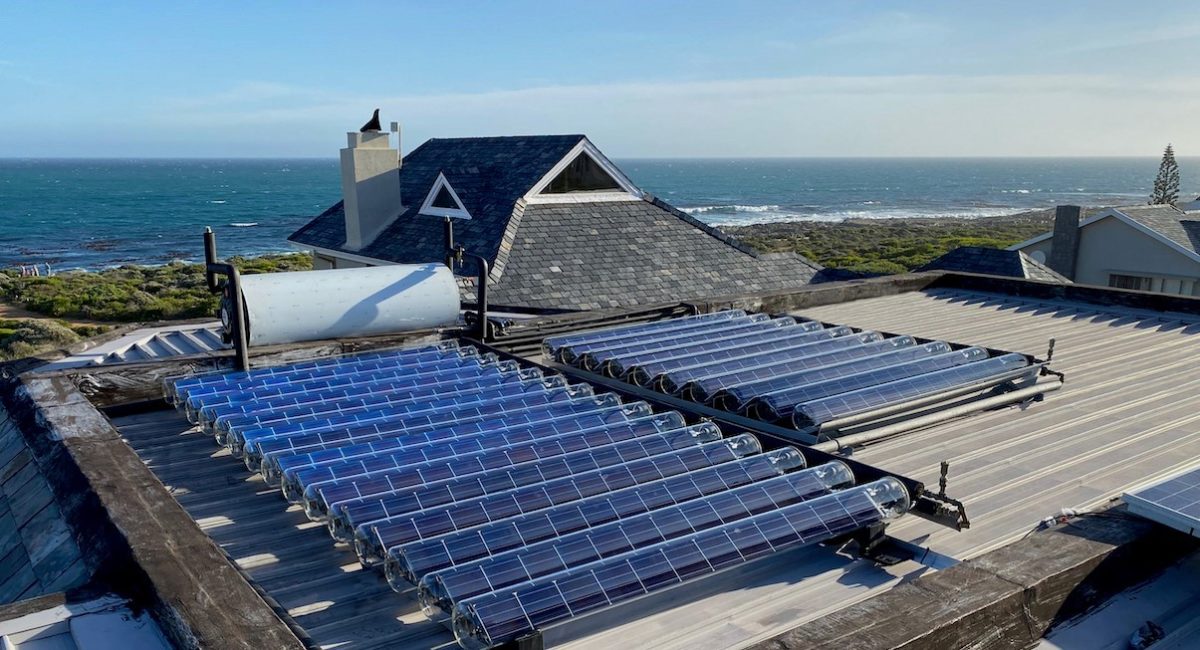UK-based startup Naked Energy has developed a photovoltaic-thermal (PVT) system with a vacuum tube configuration. It uses excess heat from PV modules to provide heating in buildings.
“Our system produces more than 20,000 kWh per 100 m² of roof space and the modular design enables quicker, cheaper installation,” a company spokesperson told pv magazine. “We are currently producing the panels at our main British manufacturing hub in Essex, but we also manufacture them in Italy, the Netherlands, and the US.”
The VirtuPVT system features an absorber plate, monocrystalline PERC solar cells, a borosilicate vacuum tube, an integrated reflector, and an integrated mounting system. The absorber plate is an extrusion heat plate with high–aspect copper channels to promote turbulent heat transfer. It minimizes thermal losses, as it uses excess heat generated in the PV cells, and reportedly generates heat at up to 80 C. That heat can be transferred into buildings via 8 mm pipes connected to a 22 mm manifold with DN16 connectors.
The manufacturer said the integrated reflectors enable the system to harvest 40% more energy compared to conventional PV and the rotating collectors can optimize performance on pitched roofs, flat roofs, and vertical facades. A single tube unit measures 2,165 mm x 300 mm x 265 mm and weighs 19.9 kg. Its aperture area is 0.64 m2 and the absorber area is 0.324 m2. Its peak thermal output is 275 W and the electrical output is 70 W.
“The vacuum tube minimizes thermal losses to the atmosphere, which results in high system efficiency even in cold weather,” the spokesperson stated. “Its compact size makes it perfect for urban settings with high heat demand but limited roof space and makes it perfect for retrofitting into pre-existing solar installations.”
Popular content
The manufacturer said the system does not requires any traditional racking and is usually deployed at a height of just 26 cm from the roof line, due to the integrated mounting structure. Its design purportedly reduces wind shear, while eliminating the need for using ballast or piercing roof membrane.
“VirtuPVT underwent a successful pre–certification test program at TÜV Rheinland, and is now being type tested under ISO9806, EN61215 and EN61730,” the spokesperson added. “Our system also requires low maintenance and is backed by a warranty of up to 10 years.”
Naked Energy recently set up several distribution partnerships with companies operating in Australia, Belgium, Canada, Italy, the Netherlands, Luxembourg, Switzerland, and the United States.
This content is protected by copyright and may not be reused. If you want to cooperate with us and would like to reuse some of our content, please contact: editors@pv-magazine.com.



1 comment
By submitting this form you agree to pv magazine using your data for the purposes of publishing your comment.
Your personal data will only be disclosed or otherwise transmitted to third parties for the purposes of spam filtering or if this is necessary for technical maintenance of the website. Any other transfer to third parties will not take place unless this is justified on the basis of applicable data protection regulations or if pv magazine is legally obliged to do so.
You may revoke this consent at any time with effect for the future, in which case your personal data will be deleted immediately. Otherwise, your data will be deleted if pv magazine has processed your request or the purpose of data storage is fulfilled.
Further information on data privacy can be found in our Data Protection Policy.